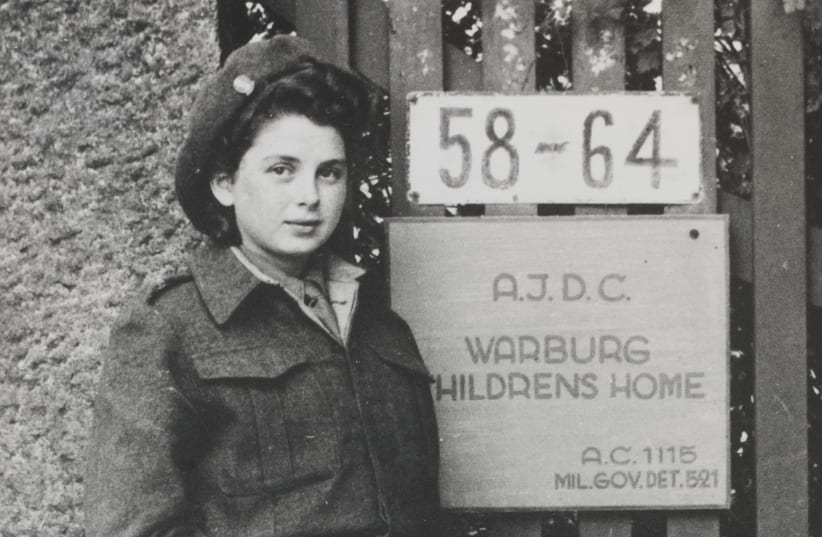New online exhibition: ‘My Lost Childhood’
“After indescribable losses – my family, my childhood and my friends – I was tormented by physical and mental pain.”
This heart-wrenching testimony of Renee Kochman (Renia Baaf), expresses the sense of the utter despair she and many thousands of survivors felt after liberation. During the war, all of their energies were focused on the daily struggle to survive. Now that they were freed by the Allied Forces, survivors began to piece together their lives.
Child survivors were especially affected by this new reality. Many of them, entrusted during the Shoah to non-Jews for hiding and safekeeping from the Nazi onslaught, were left with no one to redeem them. While DP camps helped restore a sense of community and a feeling of agency for many adult survivors, children required special care in the medical, psychological and educational spheres. In the months following liberation, social welfare organizations began establishing special children’s homes throughout much of Europe to meet these demands.
“My Lost Childhood” tells the stories of seven of these homes established at the end of the Holocaust. Through the voices of these survivors, the history of the Holocaust and its aftermath through the eyes of child survivors comes to life. As Renee Kochman later recalled: “The children’s home in Blankenese [Germany] gave me back part of my lost childhood, it became my home. My teachers and the other girls I met there became my friends and family. “
IRemember Wall: Commemorating individual victims
Once again, Yad Vashem will launch its IRemember Wall online commemoration project in six languages — English, Hebrew, French, Spanish, German and Russian. Each participant who joins the wall will be randomly linked to one of the names found in Yad Vashem’s Central Database of Shoah Victims’ Names. Their names will then appear together on the IRemember Wall; participants can also choose additional names of Holocaust victims from the Names Database to commemorate on the Wall. Those who join are encouraged to share the stories on their social media platforms. For the second consecutive year, Yad Vashem will be partnering with Facebook to promote this activity across the globe. Last year over 85,000 victims were commemorated by people from some 175 countries around the world in their own languages.
Previous participants in the project responded to a survey on the importance of remembering the atrocities of the last century, in order to ensure that history does not repeat itself.
Patrick Gilliland from Ottawa, Canada stated: “In my 20s, I shared a bench and drank coffee a couple of times a week with Mr. Stepanik, a Holocaust survivor. I knew he was a survivor only because I saw the numbers tattooed on his arm. We spoke about everything but the Holocaust. Nevertheless, just talking with him turned a horrific event that took place far away and long ago into reality. So now, I remember for him the friends and family he could not, or would not, talk about.”
“Now it seems more important than ever to remember,” Anita Klein from Budapest wrote. “I think if people remember real victims, their stories make us consider that these people were deprived of everything they had or they could have become, and this should never happen to anyone.”
The IRemember Wall reached as far as Pakistan, where Mustafa Maharvi from Faisalabad, Punjab, sent the following remarks in Arabic. “Those who were killed must be remembered. Humanity can never let the memory of the Holocaust die.”
Virtual tour of the “SHOAH” exhibition
To mark the UN-sanctioned International Day of Commemoration for Victims of the Holocaust on January 27 – the 76th anniversary of the 1945 liberation of the Auschwitz-Birkenau concentration and extermination camp – Yad Vashem is conducting for the first time ever a virtual guided tour of the permanent exhibition “SHOAH” located in Block 27 (the “Jewish Block”) at the site of the former Auschwitz-Birkenau concentration and extermination camp. As Nobel Prize Laureate and Holocaust survivor Prof. Elie Wiesel described, visitors will be able to “walk through the exhibits and be enveloped by the sights and sounds of the past, hear the voices of the victims, see the drawings of the children, and touch the names of the murdered.”
International Holocaust Remembrance Day mini-site
Because Holocaust education and awareness can help humanity combat the hatred, antisemitism and xenophobia, to round off its activities for International Holocaust Remembrance Day, Yad Vashem has opened to the general public a mini-site with specially designed content about the Holocaust, including articles and survivor testimony.
“Today, as the world continues to battle expressions of hatred, antisemitism and xenophobia, the significance and meaning of the Holocaust is particularly relevant,” remarks Yad Vashem chairman Avner Shalev. “It is Yad Vashem’s ongoing mission to make sure that the stories and voices of the Holocaust victims and survivors are maintained and preserved for generations to come.”
